Cấu trúc Used to trong tiếng Anh
Use to là gì?
Use to nếu được dùng riêng lẻ sẽ có nghĩa là: Từng, đã từng.
Used to là cấu trúc ngữ pháp tiếng Anh được sử dụng để nói tới một sự kiện đã xảy ra trong quá khứ mà không xảy ra trong hiện tại nữa. Hoặc việc sử dụng cấu trúc use to để nhấn mạnh sự khác biệt giữa hiện tại và quá khứ.
This post: Công thức used to
Ví dụ: I used to live in Ha Noi. (Tôi đã từng sống ở Ha Noi – nhưng hiện tại đã không còn nữa).
I didn’t used to stay up late when I was a student (Tôi không từng thức khuya khi tôi còn là sinh viên – giờ đã bỏ thói quen đó).

Công thức
| Khẳng định (+) | S | used | to V | ||
| Phủ định (-) | S | did | not | use | to V |
| Nghi vấn (?) | Did | S | use | to V? |
Cách dùng
Cấu trúc used to hay cấu trúc used to V được sử dụng để nói về một thói quen, hành động, sự kiện hoặc trạng thái đã từng xảy ra trong quá khứ và không còn xảy ra trong hiện tại nữa. Đôi khi nó được dùng để nhấn mạnh về sự khác biệt giữa hiện thực và quá khứ.
Ví dụ:
Khẳng định (+):
He used to be a long distance runner when he was young_ Anh ấy đã từng là vận động viên chạy bền hồi còn trẻ.
There used to be a cinema here_ Ở đây từng có một rạp chiếu phim
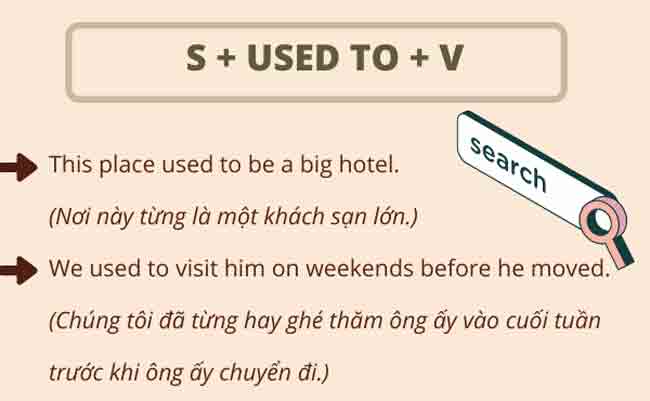
Phủ định (-):
I didn’t use to go swimming_ Trước kia tôi không thường đi bơi
She didn’t use to drink that much coffee_Trước kia cô ấy không uống nhiều cafe như vậy
Nghi vấn (?):
Did he use to smoke?_ Trước kia anh ta có hút thuốc không?
Did you use to eat meat before becoming a vegetarian?_ Trước khi trở thành người ăn chay thì bạn có ăn thịt không?
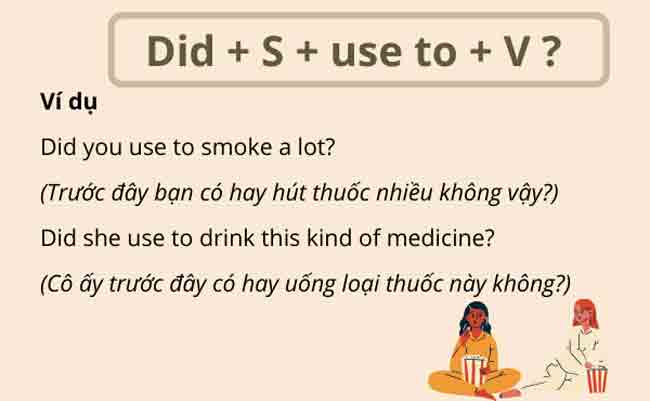
Lưu ý:
1. Phủ định của cấu trúc used to V có thể được viết dưới dạng used not to V. Ví dụ:
- I use not to go swimming.
- She use not to drink that much coffee.
2. Không có thì hiện tại với cấu trúc used to V trong tiếng Anh. Để nói về thói quen trong hiện tại, ta dùng các trạng từ tần suất (usually, always, often, never,…)
3. Used hay use?
Khi trong câu không có “did”, ta dùng “used to” (có d)
Khi trong câu có “did”, ta dùng “use to” (không có d)
2. Cấu trúc Be used to V-ing trong tiếng Anh
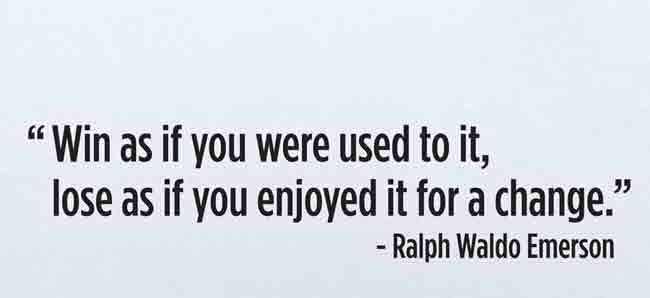
Công thức
| Khẳng định (+) | S | be (is, are,…) | used | to V-ing/danh từ. | |
| Phủ định (-) | S | be (is, are,…) | not | used | to V-ing/danh từ. |
| Nghi vấn (?) | Be (is, are,…) | S | used | to V-ing/danh từ? |
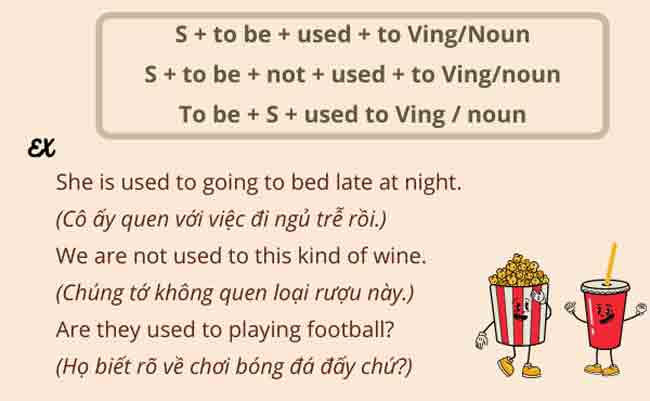
Cách dùng
Cấu trúc be used to V-ing được sử dụng để diễn tả ai đó đã từng làm 1 việc gì đó nhiều lần và đã có kinh nghiệm, không còn lạ lẫm với việc đó nữa.
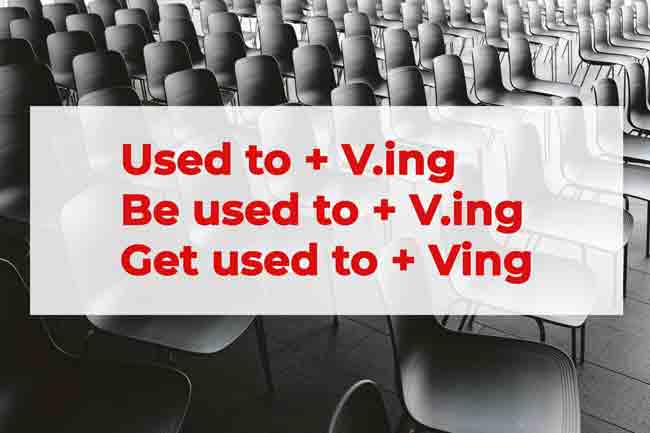
Ví dụ
Khẳng định (+):
I am used to being lied to_Tôi đã quen với việc bị nói dối rồi
He is used to working late_ Anh ấy đã quen với việc làm việc muộn
Phủ định (-):
He wasn’t used to the heat and he caught sunstroke_Anh ấy không quen với cái nóng và bị bỏng nắng
We aren’t used to taking the bus_Chúng tôi không quen với việc đi xe bus
Nghi vấn (?):
Is she used to cooking?_Cô ấy có quen với việc nấu ăn không?
Are you used to fast food?_Bạn có quen ăn đồ ăn nhanh không?
3. Cấu trúc Get used to V-ing
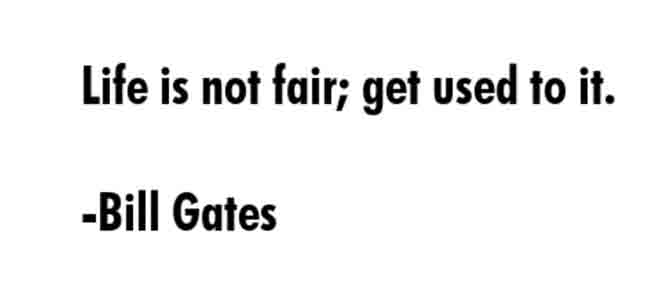
Công thức
| Khẳng định (+) | S | get used | to V-ing/danh từ. | ||
| Phủ định (-) | S | do | not | get used | to V-ing/danh từ. |
| Nghi vấn (?) | Do | S | get used | to V-ing/danh từ? |
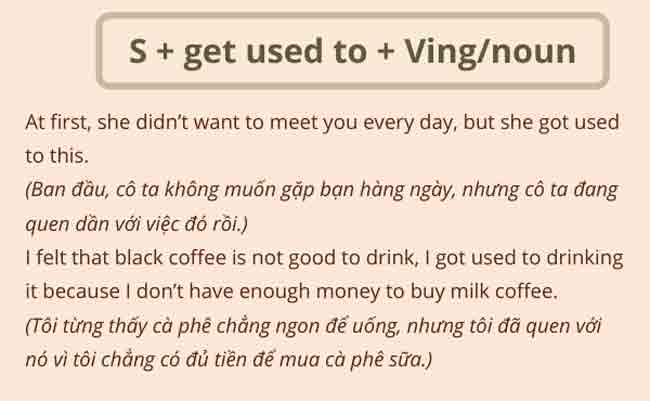
Cách dùng
Cấu trúc get used to V-ing được sử dụng để diễn tả ai đó đang dần quen 1 vấn đề hoặc sự việc nào đó.
Ví dụ
Khẳng định (+):
You might find it strange at first but you will soon get used to it_Bạn có thể cảm thấy lạ lẫm lúc đầu nhưng rồi bạn sẽ quen với điều đó
After a while Jane didn’t mind the noise in the office; she got used to it_Sau một thời gian Jane đã không còn cảm thấy phiền bởi tiếng ồn nơi công sở. Cô ấy đã quen với nó
Phủ định (-):
He wasn’t used to working such long hours when I started his new job_Anh ấy từng không thể làm quen với việc làm việc trong thời gian dài khi mới bắt đầu công việc
We couldn’t get used to the noisy neighborhood, so we moved_Chúng tôi đã không thể quen với tiếng ồn của hàng xóm, vậy nên chúng tôi chuyển đi
Nghi vấn (?):
Has your sister gotten used to his new boss?_Em gái của bạn đã quen với sếp mới chưa?
Have Tom got used to driving on the left yet?_Tom đã quen với việc lái xe bên tay trái chưa?
Lưu ý
1. Cả hai cấu trúc ‘be used to’ và ‘get used to’ đều theo sau bởi danh từ hoặc danh động từ (động từ đuôi -ing)
2. ‘Be used to’ và ‘get used to’ có thể được dùng ở tất cả các thì, chia động từ phù hợp cho từng thì. Ví dụ:
- You will soon get used to living alone.
- When we lived in Bangkok, we were used to hot weather.
- I have been getting used to snakes for a long time.
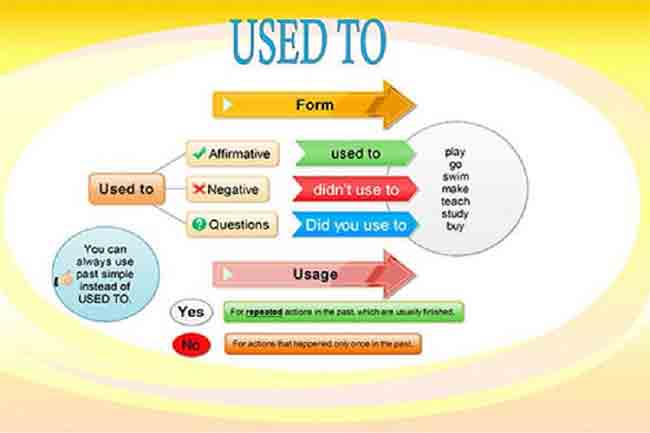
Bài tập Be used to, Used to V, Get used to trong tiếng Anh
Bài tập 1: Điền từ vào chỗ trống
1. I didn’t … to do much skiing.
2. We … to walk to school when we were children.
3. They … not to let women join this club.
4. There … to be a lake here years ago.
5. John didn’t … to like Mary when they were teenagers.
6. When … they to live here?
7. Why did you … to use this old photocopier?
8. We never … to have electricity in our house.
9. I hardly ever … to have time for going out.
10. Did they … to let you smoke in cinemas?
Đáp án
1. use 2. used 3. used 4. used 5. use 6. did … use 7. use 8. used 9. used 10. use
Bài tập 2: Chọn cấu trúc câu
1. When I started to work here I needed a lot of help, but now I (am used to doing/ ued to do/get used to doing) all the work on my own.
2. He (was used to reading/used to read/got used to reading) several books a month, but he doesn’t have time any more.
3. We were surprised to see her driving – she (got used to driving/was used to driving/didn’t use to drive) when we first met her.
4. Don’t worry, it’s a simple program to use. You (are used to/will get used to/used to use) it in no time, I’m sure.
5. When I had to commute to work every day I (used to get up/used to getting up) very early.
6. I’m afraid I’ll never (get used to living/used to live/got used to living) in this place. I simply don’t like it and never will.
7. Whenever we came to Coventry we always (used to stay/got used to staying) in the Central Hotel. We loved it.
8. When Pete Smith was the head of our office everything (got used to be/used to be/was used to being) well organized. Now it’s total chaos here.
9. Mr Lazy was shocked when he joined our busy company because he ( wasn’t used to/didn’t use to) doing much work everyday.
10. At first the employees didn’t like the new open-space office, but in the end they (got used to/get used to/are used to) it.
Đáp án
1. am used to doing
2. used to read
3. didn’t use to drive
4. will get used to
5. used to get up
6. get used to living
7. used to stay
8. used to be
9. wasn’t used to
10. got used to
BÀI TẬP THỰC HÀNH VÀ ĐÁP ÁN
1. Hoàn thành các câu dưới đây.
Bài tập
1. Liz …. a motorbike,but last year she sold it and bought a car.
2. We came to live in London a few years ago. We …. in Leeds.
3. I rarely eat ice-cream now, but I …. it when I was a child.
4. Jim …. my best friend, but we aren’t good friend any longer.
5. It only takes me about 40 minutes to get to work now that the new roadis open. It …. more than an hour.
6. There …. a hotel near the airport, but it closed a long time ago.
7. When you lived in New York, …. to the theatre very often?
Đáp án
| 1. used to have 2. used to live 3. used to eat4. used to be |
5. used to take 6. used to be 7. used to use to go |
2. Hoàn thành các câu sau
Câu hỏi
1. European drivers find it difficult to _______________________ (drive) on the left when they visit Britain.
2. See that building there? I _______________________ (go) to school there, but now it’s a factory.
3. I’ve only been at this company a couple of months. I _______________________ (still not) how they do things round here.
4. When I first arrived in this neighbourhood, I _______________________ (live) in a house. I had always lived in apartment buildings.
5. Working till 10pm isn’t a problem. I _______________________ (finish) late. I did it in my last job too.
6. I can’t believe they are going to build an airport just two miles from our new house! I will _______________________ (never) all that noise! What a nightmare.
7. His father _______________________ (smoke) twenty cigars a day – now he doesn’t smoke at all!
8. Whenever all my friends went to discos, I _______________________ (never go) with them, but now I enjoy it.
9. I _______________________ (drive) as I have had my driving licence almost a year now.
When Max went to live in Italy, he _______________________ (live) there very quickly. He’s a very open minded person.
Đáp án
| 1. get used to driving. 2: used to go. 3: am still not used to. 4: used to live.5: am used to finishing. |
6: never get used to. 7: used to smoke. 8: never used to go. 9: am used to driving. 10: got used to living. |
3. Chọn đáp án đúng
Câu hỏi
1 – I like it now, but I ____.
A. didn’t use to
B. didn’t used to
2 – I find it hard _____ to the dark evenings in winter.
A. used
B. get used
C. to get used
3 – It took me a while to get used to ____ on a continental keyboard.
A. type
B. typing
4 – I _____ to being spoken to like that!
A. am not used
B. don’t get used
C. used
5 – I ____ play football on Saturdays when I was at school.
A. was used to
B. used to
6 – Before I started cycling, I _____ go to work by bus.
A. used to
B. got used to
7 – I haven’t studied for ages and I’m finding it hard to get used to _____ every day.
A. study
B. studied
C. studying
8 – I couldn’t _____ used to the food.
A. because
B. get
9 – He never _____ behave like that.
A. used
B. used to
10 – It’s taking me a long time to ____ speaking Norwegian.
A. used to
B. get used to
Đáp án
| 1. A 2 .C 3. B 4. A 5. B |
6. A 7. C 8. B 9. B 10. B |
Bài tập 1: Sử dụng cấu trúc Used to để điền vào chỗ trống dưới đây:
- I find it difficult to………………. (drive) on the right when they visit Japan.
- I’ve only been at this company a couple of months. I……………….. (still not) how he does things round here.
- See this building there? They………………. (go) to school there, but now it’s a company.
- When I first arrived here, I………………. (live) in a house. I had always lived in an apartment.
- I can’t believe Mike is going to build his house just 500 meters from my house! I will………………. (never) all that noise!
- Working till 11pm isn’t a problem. I………………. (finish) late.
- Whenever my friends went to the library, I………………. (never go) with them.
- Her brother………………. (smoke) ten cigarettes a day.
- When Lisa went to live in England, she………………. (live) there very quickly. She’s a very open minded person.
- Mike………………. (drive) as he has had his driving licence almost 2 years now.
Bài tập 2: Chọn đáp án đúng:
1. I like it now, but I (didn’t use to/didn’t used to).
2. It took me a while to get used to (type/typing) on a continental keyboard.
3. I find it hard (used/get used/to get used) to the dark evenings in winter.
4. I (am not used/don’t get used/used) to being spoken to like that!
5. Before I started cycling, I (used to/got used to)_____ go to work by bus.
6. I (was used to/used to) play football on Saturdays when I was at school.
7. I haven’t studied for ages and I’m finding it hard to get used to (study/studied/studying) every day.8. He never (used/used to) behave like that.
9. I couldn’t (because/get) used to the food.
10. It’s taking me a long time to (used to/ get used to) speaking Norwegian.
Đáp án:
Bài tập 1:
- Get used to driving.
- Am still not used to.
- Used to go.
- Used to live.
- Never get used to.
- Am used to finishing.
- Never used to go.
- Used to smoke.
- Got used to living.
- is used to driving.
Bài tập 2:
- Didn’t use to
- Typing
- Used
- Am not used
- Used to
- Used to
- Studying
- Used to
- Get
- Get used to
BÀI TẬP CẤU TRÚC Be used to, Used to V, Get used to trong tiếng Anh
BÀI TẬP 1: Sử dụng cấu trúc used to + + a suitable verb để hoàn thành các câu dưới đây.
1. Diane don’t travel much now. She used to travel a lot, but she prefersto stay at home these days.
2. Liz …. a motorbike,but last year she sold it and bought a car.
3. We came to live in London a few years ago. We …. in Leeds.
4. I rarely eat ice-cream now, but I …. it when I was a child.
5. Jim …. my best friend, but we aren’t good friend any longer.
6. It only takes me about 40 minutes to get to work now that the new roadis open. It …. more than an hour.
7. There …. a hotel near the airport, but it closed a long time ago.
8. When you lived in New York, …. to the theatre very often?
Đáp án
2. used to have
3. used to live
4. used to eat
5. used to be
6. used to take
7. used to be
8. used to use to go
BÀI TẬP 2: Sử dụng cấu trúc “used to”, “be used to” or “get used to” để hoàn thành các câu sau
1. European drivers find it difficult to _______________________ (drive) on the left when they visit Britain.2. See that building there? I _______________________ (go) to school there, but now it’s a factory.3. I’ve only been at this company a couple of months. I _______________________ (still not) how they do things round here.4. When I first arrived in this neighbourhood, I _______________________ (live) in a house. I had always lived in apartment buildings.5. Working till 10pm isn’t a problem. I _______________________ (finish) late. I did it in my last job too.6. I can’t believe they are going to build an airport just two miles from our new house! I will _______________________ (never) all that noise! What a nightmare.7. His father _______________________ (smoke) twenty cigars a day – now he doesn’t smoke at all!8. Whenever all my friends went to discos, I _______________________ (never go) with them, but now I enjoy it.9. I _______________________ (drive) as I have had my driving licence almost a year now.When Max went to live in Italy, he _______________________ (live) there very quickly. He’s a very open minded person.
Đáp án
Question 1: get used to driving.
Question 2: used to go.
Question 3: am still not used to.
Question 4: used to live.
Question 5: am used to finishing.
Question 6: never get used to.
Question 7: used to smoke.
Question 8: never used to go.
Question 9: am used to driving.
Question 10: got used to living.
Các bài tập có đáp án về used to
Bài 1: Complete the sentences with Be used to, Get used to, Used to.
- I ____ smoke a packet a day but I stopped two years ago.
- She has started working nights and is still ___ to sleeping during the day.
- Han has lived in England for over a year so he ____ driving on the left now.
- I ___ drive to work but now I take the bus.
- I have always lived in the country but now I’m beginning to ____ to living in the city.
Đáp án:
- used to
- getting used to
- is used to
- used to
- get used to
Bài tập ngữ pháp: be used to, used to và get used to
Exercise 1: Use “used to”, “used to” or “get used to” to finish the sentences
- Korean drivers find it difficult to _______________________ (drive) on the left when they visit Britain.
- I _______________________ (go) to school over there, but now it’s a factory.
- I’ve only been at this city a few weeks. I _______________________ (still not) how they do things around here.
- When I first moved here, I _______________________ (live) in a house. I had always lived in a fat.
- Working till 9pm isn’t a problem. I _______________________ (finish) late. I did it in my last job too.
- I can’t believe they’re going to build a factory just two miles from our house! I will _______________________ (never) all that noise! What a nightmare.
- My father _______________________ (smoke) twelve cigars a day – now he doesn’t smoke at all!
- Whenever my friends went to discos, I _______________________ (never go) with them, but now I enjoy it.
- I _______________________ (drive) as I have had my driving licence almost a month now.
- When Max went to live in Japan, he _______________________ (live) there very quickly. He’s a open minded person.
Answers:
Question 1: get used to driving.
Question 2: used to go.
Question 3: am still not used to.
Question 4: used to live.
Question 5: am used to finishing.
Question 6: never get used to.
Question 7: used to smoke.
Question 8: never used to go.
Question 9: am used to driving.
Question 10: got used to living.
Exercise 2: Choose the best answer
1. I am………….milk every day.
- used to drink
- used to drinking
- use to drink
2. She has………….in a small village.
- got used to
- get used to
- got used
3. When I was young, I didn’t……………ice cream but now I eat a lot.
- use to eating
- use to eat
- used to eat
4. You must…………….English for long hours.
- used to learning
- used learn
- use to learn
5. I have……………….English every day.
- use to learn
- used to learning
- used learning
6. I am……………..for myself.
- used to cook
- used to cooking
- use to cook
7. Her son is…………television for five hours a day.
- used to watch
- used to watching
- used watch
8. I……………….a big strawberry cake a day but I stopped two years ago.
- used to eat
- used to eating
- used eat
9. I am…………..a cup of coffee in the morning.
- used drink
- use drinking
- used to drinking
10. Peter……………a bike, now he has a car.
- used to having
- used to have
- used having
Answers:
- used to drinking
- got used to living
- use to eat
- get used to learning
- got used to learning
- used to cooking
- used to watching
- used to eat
- used to drinking
- used to have
Exercise 3: Choose the best answer
- Astronauts_____ in their spaceship, but now they often work outside.
- were used to stay B. used to stay
- were staying D. had used to stay
- In the past, people _____ that the earth is round.
- were not used to believe B. used to believing
- would not use to believe D. did not use to believe
- Tuberculosis_____ incurable before.
- use to be thought B. used to be thought
- used to think D. use to think
- Formerly babies_____ of whooping cough.
- have died B. used to die C. would die D. both B and C
- These girls are used_____ in the field.
- to work B. used to lie C. would like D. to working
- Newton_____ scientific books when a boy.
- used to read B. has read C. had read D. had been reading
- Sorry! I am not _____ fast.
- used to drive B. used to driving C. use to drive D. use to driving
- Ron used to work in a small restaurant. He_____
- doesn’t any more B. still does
- is now D. had never done anything else
- I _____ in China. I’ve lived here all my life.
- am used to living B. used to living
- use to live D. am used to live
- Jane_____ for the telephone company, but now she has a job at the post office.
- used to working B. used to work
- is used to working D. am used to work
- This work doesn’t bother me. I _____ hard. I’ve worked hard all my life.
- used to working B. used to work
- am used to working D. am used to work
- Jane_____ a moustache, but he doesn’t any more. He shaved it off because his girlfriend didn’t like it.
- used to having B. is used to having
- was used to having D. used to have
- When I was a child, I _____ anyone 50 was old.
- used to think B. was used to thinking
- used to thinking D. was used to think
Answers:
| 1. B9. A | 2. D10. B | 3. B11. C | 4. D12. D | 5. C13. A |
Bản quyền bài viết thuộc trường Mầm Non Ánh Dương. Mọi hành vi sao chép đều là gian lận.
Nguồn chia sẻ: Trường Mầm Non Ánh Dương (mamnonanhduongvt.edu.vn)
Source: Mamnonanhduongvt.edu.vn
Category: Giáo dục




